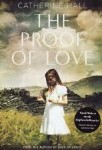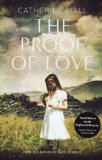Five words from the blurb: Lake District, atmospheric, farm, labourer, secrets
I lived in the Lake District for several years so always enjoy reading books based in the area. The Proof of Love provided me with everything I needed to reminisce about life in the Lakes, but I question whether it will appeal to those unfamiliar with the area.
The book is set in a remote village where people are surprised and faintly amused by the arrival of Spencer, a mathematician from Cambridge University. Spencer agrees to work as a farm labourer and he slowly adjusts to life on the fells. The villagers tend to leave Spencer to his own devices so it is only when a ten-year-old girl called Alice befriends him that he begins feel at home in this lonely place. Their strange friendship leads to the exchange of secrets and some beautifully tender moments.
The descriptions of life in the Lake District are spot-on; the hills and lakes are perfectly described. The dialogue is also authentic and the fact the characters are normally talking to an outsider means that the colloquialisms are toned down enough for most people to understand.
Half a mile along the narrow track was a humpback bridge, arched high above a river. They stood on it, looking down into a dark pool flanked by great hunks of granite rising out of the water.
‘You stand in’t middle, Spence, and jump,’ said Hartley. ‘But get it right, mind. It’s narrow. You wouldn’t want to hit the rocks. You’d smash up your legs.’ He laughed as he saw Spencer’s face grow pale.
‘You’ll be all right. No-one’s done that since Jack Porter in 1963. And he was properly drunk at the time. You haven’t had that much. Nowt to worry about.’
The only problem I had was that the plot was a bit too slow for me. It could almost be described as gentle, but that might mislead you into thinking that this is a happy book. It isn’t. There are many tragic, sometimes disturbing, scenes sprinkled through the text, but woven between them are details of domestic chores, church services and village fetes. These will either charm you, or bore you, depending on your level of interest in the every day life of Cumbrians.
I’d recommend this to anyone with an affinity to the Lake District, but if gentle tales of sheep farming and village gossip aren’t your thing then this probably isn’t for you.

.
The thoughts of other bloggers:
(An) exceptional novel which will be flying into my top five books of the year…. Savidge Reads
This is not a straightforward case of intellectualism versus physicality; it’s more about showing how the farming lifestyle has taken over the Dodds family. Follow the Thread
…intense, atmospheric, muted and with a heavy stillness. Cornflower Books


19 replies on “The Proof of Love by Catherine Hall”
I’m so pleased that you liked this book Jackie.
I found this a wonderful slow burner, or gentle as you put it, but I think that’s part of the magic. Hall treats us to wonderful descriptions of the countryside and the people, including the village mentality which is part of the plot later. It’s an earthy tale that suddenly has a nasty twist. My jaw dropped twice in two pages in the middle and then the sense of dread followed. A favourite understated book of mine! Thanks for the link too!
Simon, Slow-burner is a good way to describe this book, but it somehow feels strange to describe it in that way – those scenes in the middle/at the end are anything but slow!
I think it means everything if you are familiar with the location of a book. It still seems like it would be a great read in the right mood. In fact, I was reading a very action-packed YA book, and it annoyed me. Too much running around!
Sandy, I would be very interested to see if you enjoy this book. I think it may be like Connie May Fowler is for you. I can see why you love her writing, but without the local knowledge they aren’t as captivating. I can’t see you enjoying this one, but I would love to read your review of it. 😉
I read this one a couple of months ago after Simon recommended it over on the Booker Prize forum.
It instantly appealed to me – it’s set in the summer of 76 which is when I was born, and it has a rural setting which I always love. I thought the story was compelling and the characters, if not wholly original, were rounded and believable; and the many sections about the work on the farm and nature are beautifully done. She gave a good sense of the period without relying too much on brand names and song titles which always strikes me as a bit lazy.
But I also thought there were a number of weaknesses: the plot felt, if not predictable, then certainly inevitable – very little came as a surprise and the last 50 pages or so suffered somewhat since it was obvious where the story was going. Largely this was down to the fact that throughout the book you could clearly see Hall marshalling her characters, signposting important bits of information and generally getting all her ducks lined up for the dénouement.
Interesting that you should mention the dialogue as for me I thought she had a bit of a tin ear! Characters speak to each other but so much of it feels unnatural or expository and lacks the flow and rhythm of real conversation. One particular clunker for me was this:
“Remember those Moors Murders, over in Yorkshire, ten years or so ago. With that couple? You know, Ian Brady and Myra Hindley.”
Seriously? Anyone reading this book today (in Britain at any rate) knows who the Moors Murderers were without having it spelled out to them – in 76 I’m sure you’d have looked at someone saying that line of dialogue as though they were puddled!
Personally I wished she’d put in more dialect stuff to underline the differences between how the locals spoke and how Spencer spoke (which she refers to I think), but I take your point that they would have toned it down for him.
Curiously though, none of this got in the way of me enjoying the book, and I’ve since bought a copy of Hall’s first novel “Days of Grace” which I’m looking forward to.
David, I agree with many of your points. This book wasn’t perfect and had a lot of minor flaws. I wasn’t too bothered about the inevitability of the plot, but I do wish it had had more forward momentum, especially in the middle. I also agree that it lacked subtlety. The plot elements were all obvious and I wish there had been a few more side tracks that led nowhere.
I also agree that I’d have enjoyed the book more if it had had a stronger dialect. The problem would be that many other people wouldn’t have been able to follow it then. Cumbrian farmers have a very strong dialect and use so many colloquilaisms that it can seem as though they are speaking a different language. If they’d spoken realistically only people with a strong knowledge of the area would have been able to understand them.
But I also agree that I enjoyed the book enough to read “Days of Grace” at some point. Let’s hope it has the same strong Cumbrian atmosphere.
I don’t know if people wouldn’t have been able to understand it if there had been more dialect words. All the time I was reading it I kept thinking of Sarah Hall’s ‘Haweswater’ and how the Lakeland farmers speak in that (I don’t think she makes too many concessions to her non-Cumbrian readers!). Some words in that I didn’t know, some I could guess at, but the richness of the language added to my enjoyment and heightened the sense that the outsider in that book (the man from the water board) was in a place quite alien even if he supposedly spoke the same language.
PS: I hope you don’t mind me commenting on your posts even if I don’t blog myself? As a non-blogger I’m never quite sure of the etiquette!
David, I agree re Haweswater – that is a fantastic book! You make a good point about being able to guess at the meaning of words, but I do worry that non-Cumbrians (especially those from outside the UK) would have real trouble understanding Haweswater. It is one of my all-time favourite books though, so I suppose it is good to write to a niche sometimes. 🙂
PS. I love comments from everyone. It doesn’t matter if you have a blog or not. 🙂
Sometimes I’m in the mood for a quiet read like this one. If I were more familiar with the area described it would certainly be more appealing but I think I could enjoy it in any case.
Kathleen, If you enjoy gentle books that describe the everyday life of a community then I think you could enjoy this anyway. There is some action in there to grab the attention too. 🙂
I have never been to the Lakes District but it is definitely an area I would love to visit – hopefully one day soon… I started this book last week after reading so many wonderful things about it and rushing to buy it through The Book Depository as I couldn’t find a copy in my library. I have to say though – I just could not get into it at all. I found the introduction boring and the writing style uninspired. I put it down in favour of something else that grabbed me straight away. Now I’m not sure if I even want to go back to it…
Karen, I thought the opening few pages were some of the best so if you aren’t enjoying it then I suggest putting it aside. It isn’t a book that grabs your attention – as Simon says it is a slow-burner. I really think you need a good knowledge of the Lake District to appreciate this book so I can see why it isn’t for you. Perhaps you could pick it up again when you get around to visiting the Lakes?
Thanks for the tip Jackie – I think I will do just that!
Definitely my thing. Definitely.
Mystica, I hope that you enjoy it. 🙂
I’m not familiar with the Lake District but I was born and reared in a remote village (in N Ireland) so I think I might enjoy this. Thank you for another great review, Jackie.
Teresa, If you think you’d enjoy reading about village life then I’m sure you’ll like this one. Enjoy!
I’m still torn about whether or not I will enjoy this book, I’ve heard mixed opinion’s. I love the Lake District but am more interested in the landscape and natural beauty than the lives and gossip of local villages. I think I’m just going to have to put aside any expectations and just get on with it.
[…] The Proof of Love – Catherine Hall […]